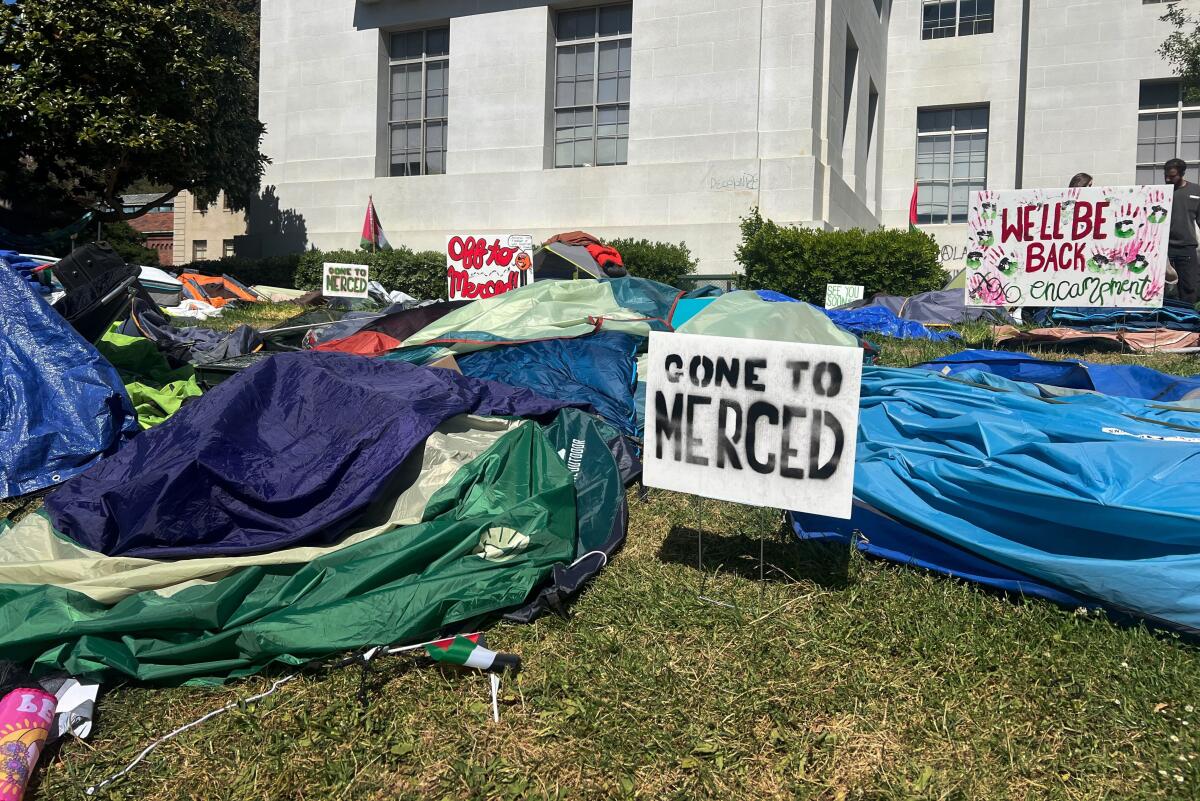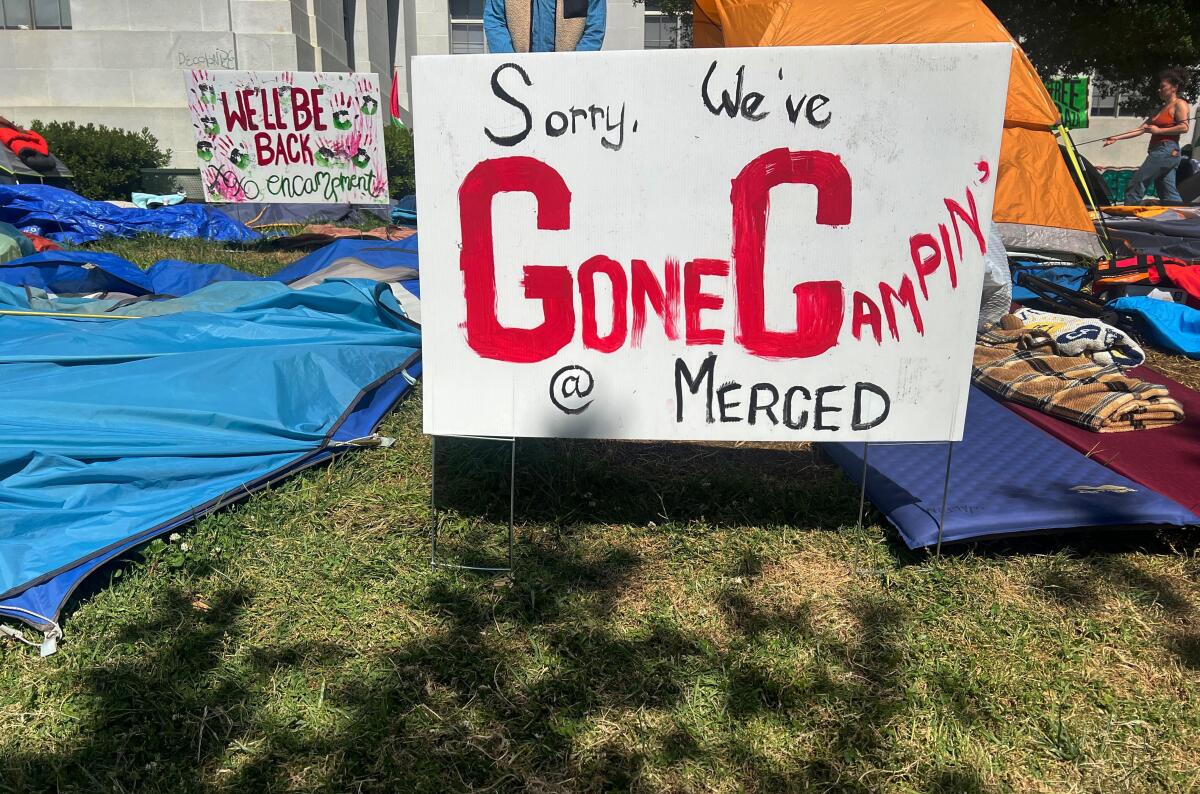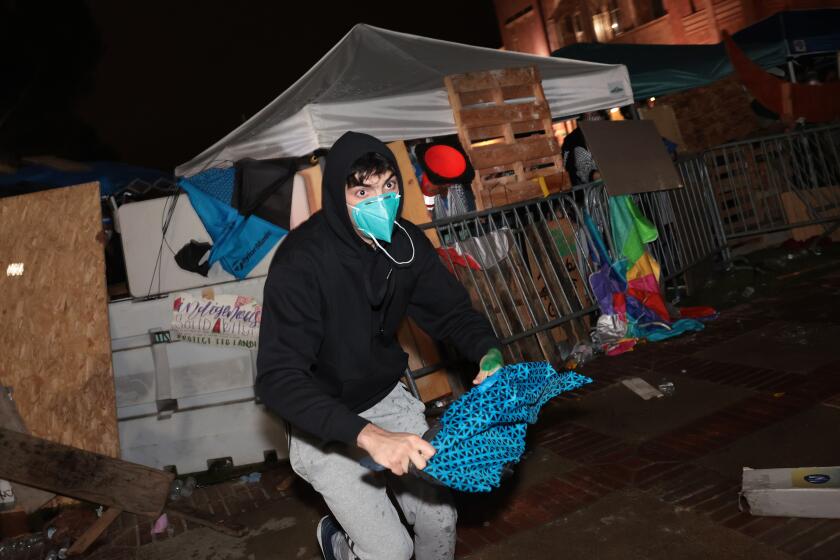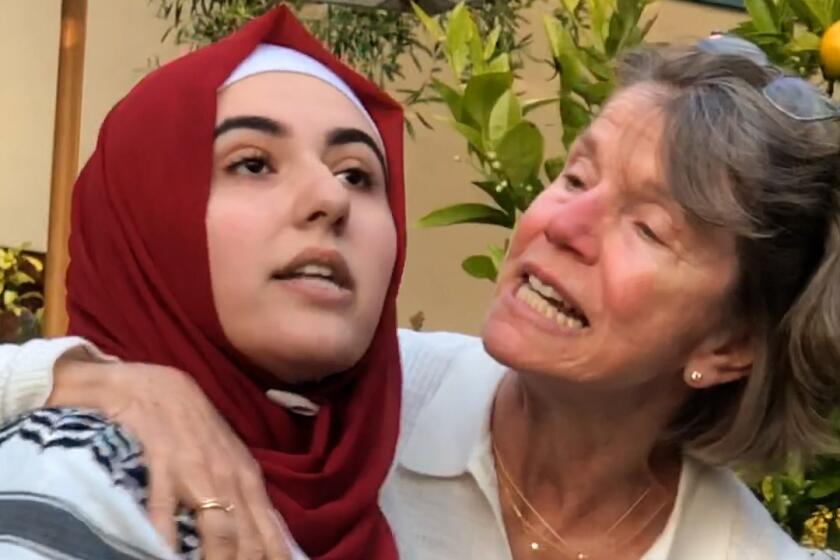UC Berkeley to consider divesting from weapons makers as pro-Palestinian protesters break camp

- Share via
BERKELEY — Pro-Palestinian protesters at UC Berkeley have removed tents on a central campus plaza in an agreement that appeared to end one of the largest and longest student encampments in the country as Chancellor Carol Christ said she would initiate a discussion about the university’s investments in weapons companies and the possible divestment from them.
The move to dismantle the encampment, which swelled to more than 180 tents and hundreds of students at its peak, notably included no police presence or arrests at a time when some universities — including UCLA, USC, Pomona College and Cal Poly Humboldt — have faced immense criticism for using police to clear camps or building takeovers by pro-Palestinian protesters. Ongoing turmoil has racked UCLA since an encampment there came under a violent mob attack two weeks ago.
The Berkeley agreement joins ones at at least four other California universities and several across the country that have forged settlements with activists to end campus encampments that some Jewish students say have included antisemitic signage and chants. While no schools have agreed specifically to divest from ties to Israel — a demand of protesters — each has indicated that it will explore proposals to tighten investment policies regarding companies that sell weapons.

At UC Berkeley, in two letters released Tuesday on the university website, Christ rejected calls for the university to directly target Israel through divestment or cutting ties with Israeli universities. Instead, she said the university would review complaints about discrimination against Palestinians and other groups in academic partnerships such as exchange programs. And the chancellor said she supported examining Berkeley’s investments in “a targeted list of companies due to their participation in weapons manufacturing, mass incarceration, and/or surveillance industries.”
The letters said that the university would create a task force by the end of June that includes faculty, students and staff to examine whether the investments of the UC Berkeley Foundation, the university’s primary private fundraising arm, “align with our values or should be modified in order to do so.”
As of June 30, UC Berkeley’s endowment had a total market value of $7.4 billion, with $2.9 billion held by the UC Berkeley Foundation and $4.5 billion held by the University of California regents. Christ said she expected a report on findings by the fall.
She also agreed to push UC regents on divestment. “I will encourage the Chair of the Regents Investment Committee to develop a framework to consider ethical issues concerning investment and any changes in investment strategy. Such a framework should involve broad-based engagement with the community,” one letter said.
The chancellor had resisted pressure to forcibly take down the encampment and instead sought to negotiate with protesters. In an interview with The Times last week, she said the Berkeley encampment had been “largely peaceful, very well run,” although some of the protest banners had disturbed her.
“I’ve got a long history of Berkeley, and in my experience protests don’t end with police action,” Christ said. “They end with negotiations.”
Here is what we know about the last couple of weeks on campus, based on interviews, recordings, social media and documents.
On Tuesday afternoon, a banner displayed across Sproul Hall before campers departed read, “Free Palestine encampment until UC divests. Glory to the martyrs, victory to the resistance.”
Students, who staged a rally Tuesday afternoon, read Christ’s letters and applauded the chancellor’s expression of support for an “immediate and permanent cease-fire” in the Israel-Hamas war.
Activists said their protests are not over.
“We are not declaring victory. We are saying it is time to move on to the next step, to take this campaign, to take this movement, to the office of the regents, to the office of the president, until we win complete divestment,” a student leader said.
Divestment “won’t come from Berkeley. It will come from the regents ... deciding and determining that, ‘Yes, we no longer want to have blood on our hands,’” said Banan Abdelrahman, a graduate student and member of the UC Berkeley Divest coalition.
In a statement released Tuesday evening, organizers of the encampment said, “Palestinians have given us the roadmap to liberation, and we will keep treading that path — from Berkeley to Merced all the way to a free Jerusalem in a free Palestine.”
Students said they would travel to UC Merced, where protesters from across the state planned to converge at Wednesday’s regents meeting.
Speaking at the regents committee meeting Tuesday in Merced, UC Chief Investment Officer Jagdeep Singh Bachher said that more than 18% of UC’s $175 billion in investments is tied to Israel, weapons companies and other holdings targeted by pro-Palestinian divestment activists. He said the funds were indirectly invested, such as through index mutual funds or U.S. Treasury bonds.
Berkeley protesters also encouraged members of the UAW Local 4811 academic workers union to support a strike vote. Results were expected Wednesday night.
The union, which represents 48,000 workers across the 10 University of California campuses, including graduate students who are teaching assistants, has filed unfair labor practice charges against the university system after arrests of pro-Palestinian graduate student protesters at UCLA and the issuing of suspensions and other discipline at UC San Diego and UC Irvine. The union has accused the university of retaliating against student workers and unlawfully changing workplace policies to suppress pro-Palestinian speech.
The dismantling of the UC Berkeley encampment does not end the controversy at the university. The campus for months has been roiled by deep divisions over pro-Palestinian activism, which some members of the Jewish community said has veered into antisemitism.
UC Berkeley professor Erwin Chemerinsky and his wife, professor Catherine Fisk, got into a heated argument with a pro-Palestinian protester during a dinner at their home.
The Bay Area Jewish Community Relations Council criticized the university for its response.
“The concessions that have come as a result of the encampment have rewarded students for violating university rules and harassing other students, particularly Jewish students,” said Jeremy Russell, a spokesman for the council. “It’s appalling that the administration was not able to respect the activists’ right to free speech and peaceful protest without capitulating to demands and encouraging, even if inadvertently, the violation of their own policies.”
In March, the U.S. Department of Education launched a civil rights investigation into UC Berkeley over potential “shared ancestry violations” of Title Vl of the Civil Rights Act of 1964. The law bans discrimination on the basis of race, color or national origin, including harassment based on a shared ancestry or ethnic characteristics.
The investigation followed a volatile incident in February when protesters targeted a campus event featuring a controversial Israeli speaker. The protest escalated and UC Berkeley police evacuated the event as demonstrators broke open a door to the building and shattered a window. The university launched its own investigation into the incident. A rescheduled event for the speaker later took place without incident.
The UC Berkeley pro-Palestinian protesters, a coalition of dozens of university groups, set up the camp April 22. It had demanded that the university call for a cease-fire in the war in Gaza, divest from investments in weapons and military companies tied to the war and Israel’s occupation of the West Bank, sever ties with Israeli universities and establish a Palestinian Studies program.
The University of California has rejected calls for divestment. In late April, it said in a statement that the university system “has consistently opposed calls for boycott against and divestment from Israel. ... A boycott of this sort impinges on the academic freedom of our students and faculty and the unfettered exchange of ideas on our campuses.”
In her Tuesday letters, Christ, who is retiring at the end of June, reiterated the position. “As stated by the University of California Office of the President, divestment from companies on the basis of whether or not they do business with or in Israel is not supported. The sale of direct investments is not within the authority of the Office of the Chancellor but rather lies with the UC regents.”
Encampments and protests took place at UC Berkeley and Cal Poly Humboldt, and plans were shaping up for more pro-Palestinian protests at California colleges and universities.
Also on Tuesday, Harvard University activists who had set up for 20 days in Harvard Yard said they would end their protest. The university did not agree to divestment. It said in a statement that it would “pursue a meeting between encampment participants and the chair of the corporation committee on shareholder responsibility and other university leaders for a discussion regarding students’ questions related to the endowment.”
Harvard also said it would reinstate at least 22 student protesters who had been put on involuntary leaves of absence.
“We are under no illusions: we do not believe these meetings are divestment wins. These side-deals are intended to pacify us away from full disclosure & divestment. Rest assured, they will not,” said a statement from the encampment group, Harvard Out of Occupied Palestine.
The recent agreements between colleges and student protesters in California share similarities in providing official forums for discussion on investments, although some go further on divestment.
UC Riverside Chancellor Kim A. Wilcox signed off May 3 on an agreement to end the encampment at his campus. It was the first such agreement at a UC campus and said that the university would publicly make a “full disclosure” of the companies and size of its investments.
It also said that UC Riverside would form a task force that includes students and faculty to “explore the removal of UCR’s endowment from the management of the UC investments office and the investment of said endowment in a manner that will be financially and ethically sound for the university with consideration to the companies involved in arms manufacturing and delivery.” The task force would present its findings to the board of trustees by March 21, 2025.
“It has been my goal to resolve this matter peacefully and I am encouraged by this outcome — which was generated through constructive dialogue,” Wilcox said in a statement.
“This agreement does not change the realities of the war in Gaza, or the need to address antisemitism, Islamophobia, and other forms of bias and discrimination,” Wilcox said. “However, I am grateful that we can have constructive and peaceful conversations on how to address these complex issues.”

Sacramento State
President Luke Wood announced May 8 that the university had agreed with protesters to change its investment policy for its five auxiliaries managed by the university — including a philanthropic and fundraising arm — to focus only on “socially responsible investment strategies which include not having direct investments in corporations and funds that profit from genocide, ethnic cleansing, and activities that violate fundamental human rights.” The university also said it did not have direct ties to funds related to the Israeli military.
At Occidental College, a pro-Palestinian encampment came down Friday after an agreement was signed that said the college’s board of trustees would vote by June 6 on whether to divest from companies with ties to Israel.
“Demonstrators agree not to cause or promote substantial disruption of Occidental’s Commencement ceremony on May 19, 2024, which would create safety concerns for attendees, violate any College policies, or require pausing, canceling, or relocating of the event,” the agreement said.
On Tuesday, protesters at Sonoma State University agreed to end their encampment after President Mike Lee met several demands, including vowing to create a Palestinian studies curriculum and not pursue academic partnerships that are “sponsored by, or represent, the Israeli state academic and research institutions.” Lee said the university would look into “divestment strategies.”
Kaleem reported from Los Angeles, Watanabe from Merced and Wiley from Berkeley.
More to Read
Sign up for Essential California
The most important California stories and recommendations in your inbox every morning.
You may occasionally receive promotional content from the Los Angeles Times.
















